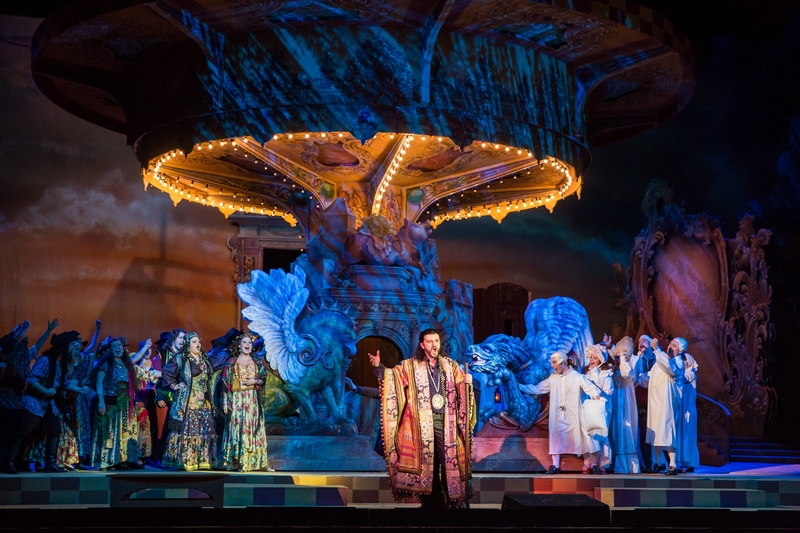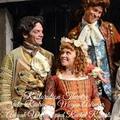 Gypsy Baron and Oberon
Gypsy Baron and Oberon
at the Erkel Theater
The plot of The Gypsy Baron is simplicity itself, but to understand the cultural context we have to go back to when it was composed in 1884. Johann Strauss, Jr., was looking for a Hungarian story for his next operetta, and a collaborator suggested Mór Jókai’s short story (sometimes referred to as “Saffi”). This was after the failed Revolution of 1848, in which Jókai played an active role, and the Austro-Hungarian Compromise of 1867. Strauss, who had composed a polka entitled “Long Live the Hungarians,” strongly advocated for friendlier relations between the two nations in the Dual Monarchy. Jókai’s tale suited his needs perfectly. It is no accident that it is set during the reign of Maria Theresa (1740-1780), when the brave Hussars defended the empire from the Spanish. Strauss went so far as to include a passage from the Rákóczi March, the rallying song for the Hungarian revolution, which was previously banned from the Viennese stage.
Over the years, The Gypsy Baron has been revived and adapted time and time again, with no less than 20 known versions in Hungary and abroad. This gives producers a free hand to make whatever they pleased out of it. As the story-book projection during the overture makes clear, this is to be a lesson about Hungary’s culturally diverse past and the benefits of multiculturalism. To hammer the message home, András Hábleter is enlisted to play an obnoxious and largely superfluous narrator, who then must justify his presence onstage with distracting business
Director Miklós Szinetár was wise to set this new production in a carnival atmosphere, with a large merry-go-round as its centerpiece, capable of whisking away massive set pieces. In this context, the director can be just as pastel and chintzy as he wishes. This adds to the fairy-tale quality of the plot, and it often feels as if we are watching children’s theatre for adults. The silly humor is also quite childlike. When Orsolya Hajnalka Rőser sings “Frühlingstimmen” by Johann Strauss, just for the sake of a bravura bel canto number in the third act, Maria Theresa asks “Strauss? Who is this Strauss?”
The third act is little more than an extended happy resolution, like the third act of Queen of the Csardás which Szinetár directed in 1954 with Hanna Honthy. It includes an odd set piece where ballet dancers in blue perform to a classical rendition of “The Blue Danube,” but then don various costume pieces as the music morphs through styles meant to be easily identifiable as Slavic, Gypsy, Klezmer, etc. This, then, is another advantage of multiculturalism. We can enjoy tacky appropriations of each other's music and folk costumes. The splendid mezzo Bernadett Wiedemann also delivers a blistering short speech about the plight of modern-day Roma in Hungary. This social commentary is well-intended, but the production is simply too fluffy to support it.
Another fluffy piece was on offer at the Erkel Theater in the form of Carl Maria von Weber’s rarely performed work Oberon. This was performed by the opera company of Kolozsvár [now Cluj-Napoca in Romania], but it was not as successful as their previous show (King Béla’s Flight / Prince Pikkó).
Certain details stand out. There were very interesting set pieces in the form of over-sized animals and insects, clearly made of some inexpensive material. The costumes were mixed. Some showed off the attractive bodies of certain dancers and cast members well; others had all the originality of a costume rental shop. Thankfully, the narration was handled skillfully here by a young actor and a young actress. Like jesters, they played a variety of roles and commented on the action with ironic humor. Nonetheless, perhaps the dancing was the most effectively employed element of the production.
The overall effect, however, was lame. The story, which cribs freely from Shakespeare and Mozart, had a childish quality, and it was none too compelling. (I imagined that the scene where the hero was seduced by mermaids had been heavily inspired by Wagner, but it turns out Weber died in 1826, when Wagner was only 13.) Possibly, too, the dimensions of the Erkel stage were to blame. The entire production appeared meager and under-scale. Moreover, a few of the singers were clearly not up to the vocal demands. Should Oberon return to Budapest, I would recommend it to die-hard Weber fans, but practically no one else.
A bejegyzés trackback címe:
Kommentek:
A hozzászólások a vonatkozó jogszabályok értelmében felhasználói tartalomnak minősülnek, értük a szolgáltatás technikai üzemeltetője semmilyen felelősséget nem vállal, azokat nem ellenőrzi. Kifogás esetén forduljon a blog szerkesztőjéhez. Részletek a Felhasználási feltételekben és az adatvédelmi tájékoztatóban.




